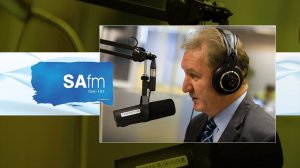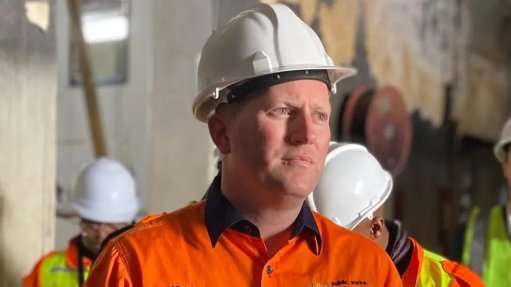On-The-Air (22/04/2022)
Every Friday, SAfm’s radio anchor Sakina Kamwendo speaks to Martin Creamer, publishing editor of Engineering News & Mining Weekly. Reported here is this Friday’s At the Coalface transcript:
Kamwendo: South Africa is positioning itself as a favoured iron-ore supplier for ‘green’ steel production.
Creamer: Yes, this is Kumba Iron Ore in the Northern Cape. It is a subsidiary of Anglo American. Anglo American is going all out to make sure that we are the favourite iron-ore supplier, because you have already got very lumpy ore, which is what is required, but with climate change, there is going to be an alteration in the way people process that ore. Instead of using blast furnaces, they are going to go for directly reduced iron. It is a different method of doing it, which is less deleterious to the climate. What they want is the iron-ore suppliers to prepare that iron-ore well so that it is ready to go green. They want green steel, because steelmaking puts a lot of emissions, a lot of carbon dioxide emissions, into the air. They want to reduce that dramatically and they want the iron-ore suppliers to work with them. Kumba Iron Ore in South Africa is doing that, preparing to make sure that they can help Salzgitter in Germany produce green steel.
Kamwendo: The hydrogen economy has the potential to be 25 times bigger that our iron-ore industry, Minerals Council South Africa has reported
Creamer: This Minerals Council South Africa appointed an independent company to study this in depth. They came up with the comment that this whole issue of the hydrogen economy is exceedingly exciting. It's an opportunity that they are now working on. They are setting up a leadership forum themselves. Of course, we have always produced grey hydrogen. Sasol has been doing it since 1950. So we've got a tremendous insight into that - probably bigger than most other countries. But what is needed in the world now is green hydrogen and you produce that using the sun and the wind as it helps in that it is clean electricity. A lot of the mining companies are now wanting to move over to this. Anglo is already doing that. It's got a big truck that it will launch soon, that will be driven by green hydrogen and the excess green hydrogen they want to supply to the community. So communities around the mines that don't have electricity, they can also benefit from low cost electricity, and they're working with the government on the whole period that we await now to try and really get ourselves deeply into this whole hydrogen economy which we see developing all around the world.
Kamwendo: The hydrogen economy has the potential to be 25 times bigger that our iron-ore industry, Minerals Council South Africa has reported.
Creamer: It's inextricably linked to platinum. So the hydrogen, particularly the green hydrogen, economy and the platinum group metals, they are joined at the hip. That is a great benefit to South Africa. So we want to have what they call fuel cells in as many places as they can and also PEM electrolysers – the electrolysers that produce green hydrogen are called PEM electrolysers. We want to get those because they use our platinum group metals. Then there is also fuel cells. If you have got a vehicle now that needs to be electrified, you can have a fuel cell in it and with the green hydrogen you will have mobility like you have got now. You will have the range you have got now but except you will have no emissions that damage the climate and you will have a silent vehicle, which is also one of the big benefits. So they are saying look to fuel cell electric vehicles. They are asking the government to create an environment and they want to have a hydrogen corridor coming from Limpopo to Gauteng to KwaZulu-Natal to test all this out and big trucks. They will be the first users of the fuel cell electric vehicle technology.
Kamwendo: Thanks very much. Martin Creamer is publishing editor of Engineering News and Mining Weekly.
Article Enquiry
Email Article
Save Article
Feedback
To advertise email advertising@creamermedia.co.za or click here
Press Office
Announcements
What's On
Subscribe to improve your user experience...
Option 1 (equivalent of R125 a month):
Receive a weekly copy of Creamer Media's Engineering News & Mining Weekly magazine
(print copy for those in South Africa and e-magazine for those outside of South Africa)
Receive daily email newsletters
Access to full search results
Access archive of magazine back copies
Access to Projects in Progress
Access to ONE Research Report of your choice in PDF format
Option 2 (equivalent of R375 a month):
All benefits from Option 1
PLUS
Access to Creamer Media's Research Channel Africa for ALL Research Reports, in PDF format, on various industrial and mining sectors
including Electricity; Water; Energy Transition; Hydrogen; Roads, Rail and Ports; Coal; Gold; Platinum; Battery Metals; etc.
Already a subscriber?
Forgotten your password?
Receive weekly copy of Creamer Media's Engineering News & Mining Weekly magazine (print copy for those in South Africa and e-magazine for those outside of South Africa)
➕
Recieve daily email newsletters
➕
Access to full search results
➕
Access archive of magazine back copies
➕
Access to Projects in Progress
➕
Access to ONE Research Report of your choice in PDF format
RESEARCH CHANNEL AFRICA
R4500 (equivalent of R375 a month)
SUBSCRIBEAll benefits from Option 1
➕
Access to Creamer Media's Research Channel Africa for ALL Research Reports on various industrial and mining sectors, in PDF format, including on:
Electricity
➕
Water
➕
Energy Transition
➕
Hydrogen
➕
Roads, Rail and Ports
➕
Coal
➕
Gold
➕
Platinum
➕
Battery Metals
➕
etc.
Receive all benefits from Option 1 or Option 2 delivered to numerous people at your company
➕
Multiple User names and Passwords for simultaneous log-ins
➕
Intranet integration access to all in your organisation


















